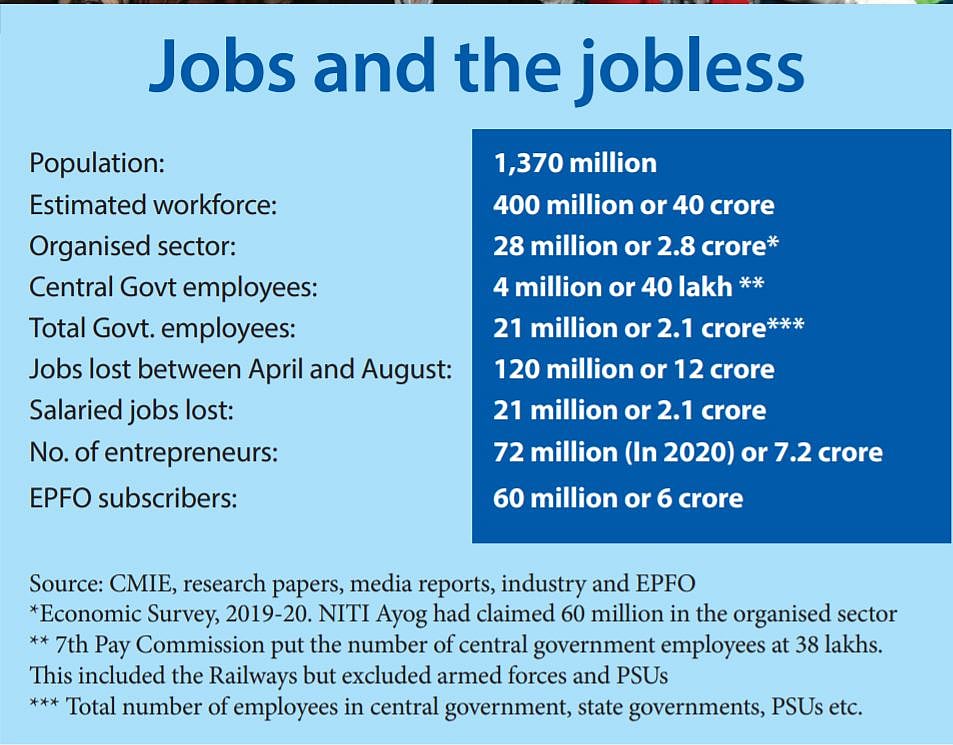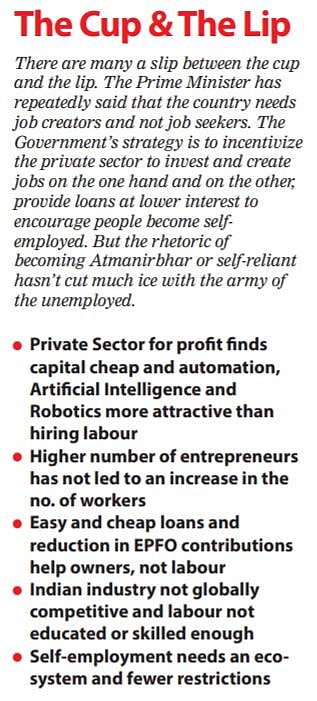The army of the unemployed wait for secure and salaried jobs but the Govt is in denial
As many as 21 million salaried jobs are estimated to have been lost during the lockdown between April and August. The total number of central and state government employees is less than that.

Six months after one of the harshest lockdowns in the world, how severe is the employment crisis in India? Alarming, warn most experts. “Youngsters were supposed to get jobs, engineer the growth rate, and save for the long-term. All of that is kind of lost…young people will not be able to save for the future and that will affect the next generation too,” warns Mahesh Vyas, economist and CEO of CMIE (Centre for Monitoring Indian Economy).
An indicator of the explosive situation on the ground was the Twitter storm generated on Prime Minister Narendra Modi’s 70th birthday. By early evening on September 17, over four million tweets observed the day as ‘National Unemployment Day’ and mocked Narendra Modi’s promise in 2014 that he would create 20 million jobs every year.
From Twitter trends to street protests, the subject of joblessness received more traction than celebrations of the Prime Minister’s birthday. On Twitter, #17Baje17Minute, #NationalUnemploymentDay and #RashtriyaBerozgariDiwas were the most trending hashtags in India, cumulatively accounting for over 40 lakh tweets by 7.30pm. (#17Baje17Minute was a call for protests at 5.17pm on September 17). #HappyBirthdayPMModi and allied tags such as #RespectYourPM had by then registered just over five lakh tweets.
What the educated unemployed are looking for are secure, government jobs. They see job losses all around them following the lockdown but government employees remain unaffected by the pandemic and take home the same salary that they did before the lockdown in March. But in the informal and the private sector, job cuts have been sudden, wage cutshave been widespread, leaving employees in the lurch. The uncertainty is killing.

“I was asked to go on leave in May during the pandemic because there was no work in the real estate sector. A month later, I was fired,” says 29-year-old Vinod Verma, a sales executive. “I am an automobile engineer but I had to accept a huge pay cut and work in the communications department,” confides Manish, an employee with an automobile company.
Sachin Marathe, who quit his job at a call centre in February, confident that he would have no trouble finding a better job, is in a state of shock. “There are just no jobs out there. It’s difficult to know what to do. We spend all day scrolling through online job sites”.
“In the absence of government jobs, young men here are not getting married,” says Hansraj Meena over the phone from Karauli in Rajasthan. Even a lowly Grade D job in a government department or the Railways, he adds, are much sought after but the Government is reluctant to fill vacancies.
Meena, whose outfit Tribal Army was at the forefront of the Twitter storm on September 17, says that thousands of youth have been kept waiting for years even after filling up forms and paying the fees for recruitment tests. “The Government is privatising the Railways and other PSUs because it wants to phase out Reservation from the Government. This will be resisted,” he warns.
Tribal Army’s national spokesman Rishikesh Meena informs that the outfit was created in 2016 to make the voice of the disadvantaged heard on social media. Till then there were very few on Twitter raising issues of employment, forest rights or displacement. But now things are changing, he claims.
While jobless growth was worrying between 2004 and 2016—when India’s GDP grew at a fast clip but jobs failed to keep pace—the last three years have seen a steady increase in the unemployment rate. The lockdown in March this year accelerated the slide into a dark hole. With the number of the unemployed and the ‘under-employed’ spinning out of control, experts warn of severe social unrest, steep rise in crime and a mental health crisis in the foreseeable future.
At the height of The Great Depression in the United States in 1932-33, there were 1.5 crore unemployed in the US. Even when the number of all the unemployed in Europe were added, the number, pointed out Yogendra Yadav in a recent write-up, would not have exceeded 50 million or five crore.
But between April and August this year, estimates CMIE (Centre for Monitoring Indian Economy), as many as 120 million or 12 crore jobs were lost in India. The loss of salaried jobs alone during this period, suggested the CMIE, was a staggering 21 million or more than two crore. Add to this the 3.4 crore people who were unemployed at the time of the lockdown and the total number of the unemployed in the country today would be a mind blowing 15 crore (The entire population of the United States is 33 crore).

‘Salaried workers with insecure jobs’overwhelmingly comprise salesmen, delivery boys, waiters and the like, taking home between 6 and 16 thousand Rupees a month. A CMIE study pointed out “While salaried jobs are not lost easily, once lost they are also far more difficult to retrieve”.
Significantly, the government’s own data tells us that the average monthly earning of a self-employed person in 2018-19 was just Rs 8,363. On the other hand, a regular formal job provided an average monthly salary of Rs 25,866.
Warning signals were there. The then Professor at Oxford Craig Jeffrey, who now teaches in Melbourne, wrote a striking book in 2010 on the ‘Time Pass Generation’ of Uttar Pradesh. He spent several years observing and interacting with the youth in Meerut and wrote about an entire generation waiting for a full-time job and a meaningful occupation after their graduation and post-graduation.
Jeffrey perceptively observed in an interview, “They stand around on street corners, play cards, watch television, gossip, and get into fights. Many of these men depended on their parents to remain idle, and this creates inter-generational tensions… Timepass has become an identity for these menhanging out together’.
Many of them work as ‘fixers’, using their social and political connections to seal land deals, make alterations in government records, serve as professional witnesses in courts, provide tips to the police or help political parties mobilise a crowd or a vigilante group. Some become court clerks while others seek to work as researchers and social workers with NGO’s. A few take to teaching or become land brokers or taxi drivers.
Both Jeffrey and journalist Snigdha Poonam who wrote the much acclaimed book ‘The Dreamers’ on the ‘Timepass generation’ noted that aspirational youth in small towns and villages were no longer content to do manual work or follow traditional trades. The restless youth range from ‘dubious entrepreneurs to political aspirants, from starstruck strivers to masterly swindlers… wealth-chasers, attention-seekers, power-trappers and fame-hunters’. They are looking for a short cut to easy money, more than willing to commit credit card or bank frauds and to swindle the gullible.
The army of the unemployed are waiting. How long will they wait for jobs is something that should worry just about everyone.
Follow us on: Facebook, Twitter, Google News, Instagram
Join our official telegram channel (@nationalherald) and stay updated with the latest headlines
